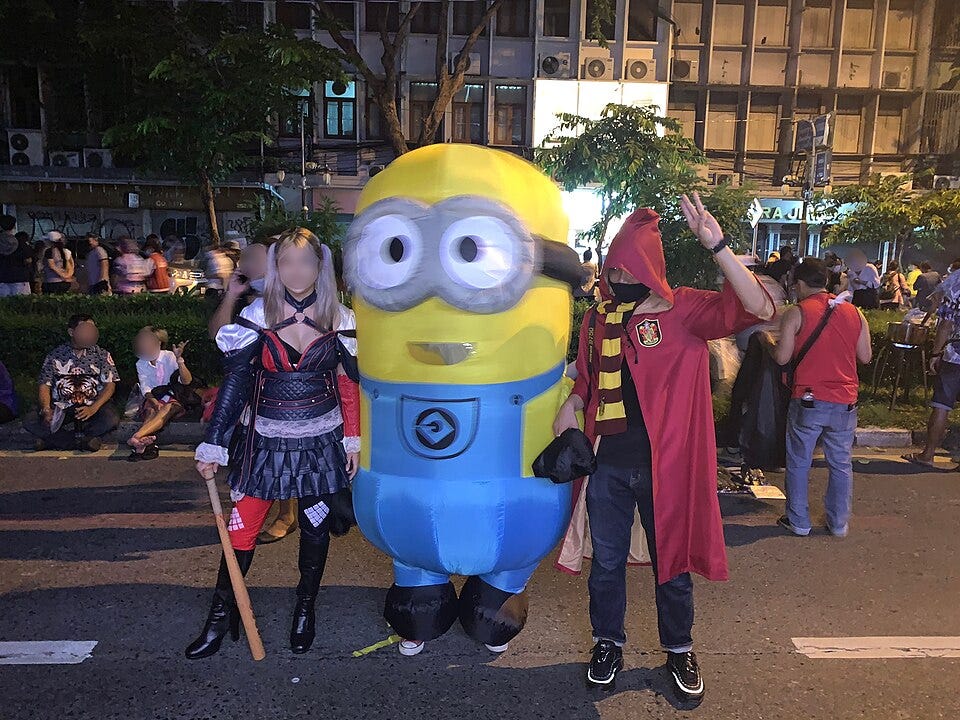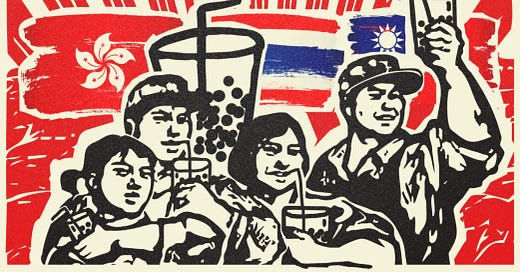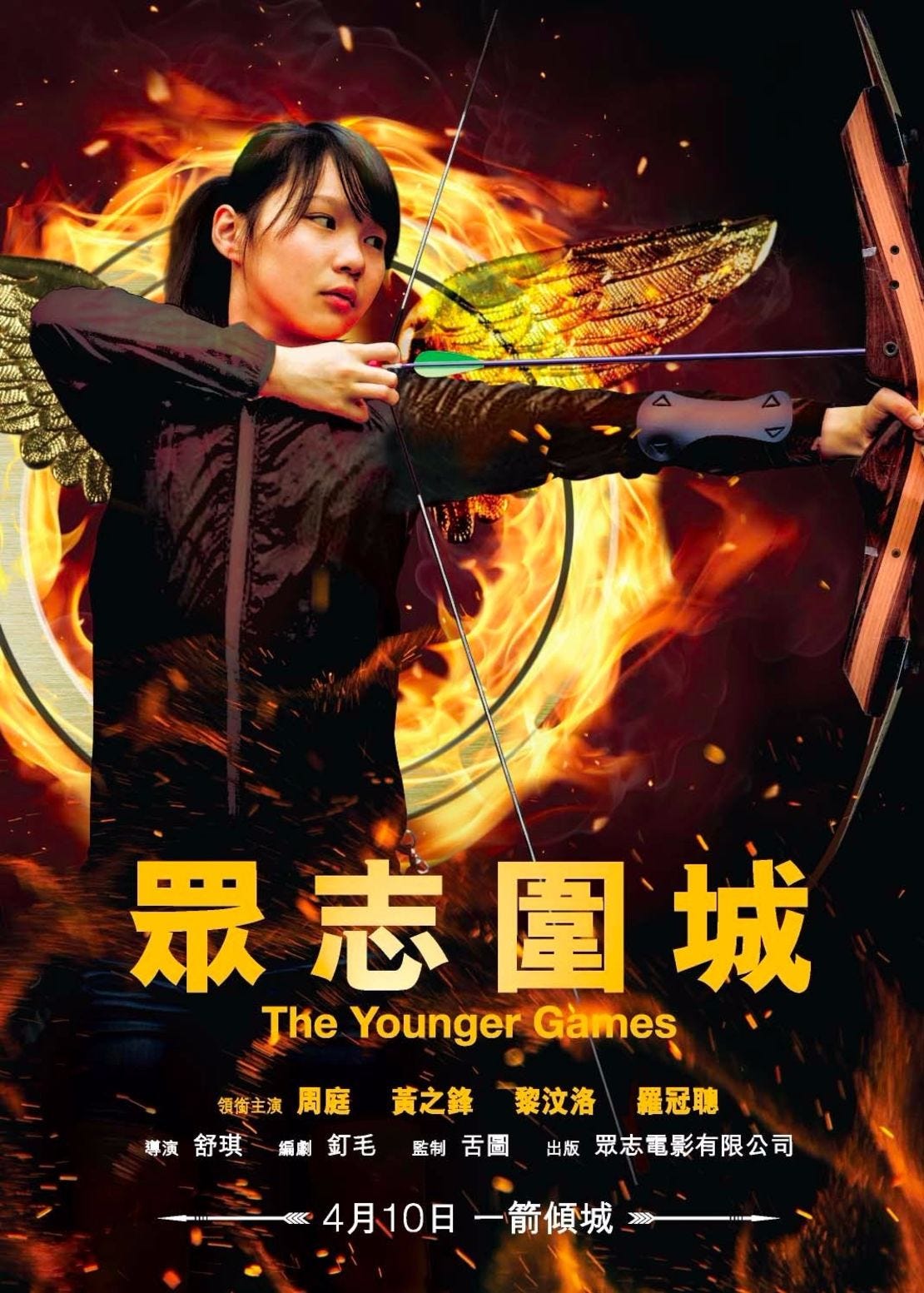Boba, Grass Jelly, Light Ice, Democracy
On Jeffrey Wasserstrom’s The Milk Tea Alliance
The wonderful folks at Cha: An Asian Literary Journal published a version of this review on May 31st. It is republished here with their permission. Cha is a great resource for learning more about film, literature, and poetry from across Asia. I highly encourage readers of this newsletter to check it out.
The version of the review below is the original I submitted. In the bottomless depths of my narcissism, I prefer my less academic tone. Wasserstrom’s book is a good early entry into the history of the Milk Tea Alliance. A fuller history is needed, but I hope this opens the door.
Thanks,
Nick
Boba, Grass Jelly, Light Ice, Democracy:
On Jeffrey Wasserstrom’s The Milk Tea Alliance
The entirety of the twentieth century in Asia was defined by protest, revolution, and upheaval. Not in all places at all times, but in enough places most of the time. In the waning years of the Cold War, after much of the region had rid itself of imperial dynasties, monarchies, and overt colonialism, the Japanese scholar of Chinese literature, Takeuchi Yoshimi, wrote that Asia must now “re-embrace the West.” What he meant by this, however, was not some apolitical diplomatic engagement. Instead, Takeuchi wanted Asia to “change the West in order to further elevate those universal values that the West itself produced.” In other words, only former French colonies, by virtue of having defeated French colonialism, could teach France what liberté, égalité, fraternité really meant.
Liberation from French (or American, British, Dutch, Spanish) rule was only step one. Step two was holding the West accountable to its own purported values, things like universal human rights, globally. In the second decade of the twenty-first century, young people in many places across Asia were indeed at the forefront of the fight to universalize what are often called Western values. Only this time, in places like Hong Kong, Thailand, and Myanmar (Burma), the opponents were primarily at home and, to a wildly varying degree, in China. This latter international struggle is the subject of historian Jeffrey Wasserstrom’s brief new book, a sort of academic novella, The Milk Tea Alliance: Inside Asia’s Struggle Against Autocracy and Beijing (Columbia Global Reports, 2025). Clear, well-researched, and interesting, the book is worth wide discussion.
The Milk Tea Alliance was born as a hashtag on Twitter. In April 2020, a Thai actor in the internationally popular drama 2gether, Vachirawit Chivaaree (nicknamed Bright), liked a tweet that called Hong Kong a “beautiful country.” Bright’s fans in the People’s Republic of China (PRC) noticed this indirect afront to their government’s One China policy and entered a mass online apoplectic state of denunciation and investigation. They discovered Bright’s girlfriend had retweeted and liked posts that crossed lines of political correctness on China’s role in the COVID-19 pandemic and on the status of Taiwan, which prompted a call to boycott 2gether – a show never officially released in the PRC in the first place. In response, Twitter users in Thailand, Hong Kong, and Taiwan rallied around the hashtag #MilkTeaAlliance, generating millions of tweets opposing the imposition of Chinese nationalism throughout the region. Posts with the hashtag quickly grew to incorporate opposition to respective local authoritarianism and love of local versions of milk tea.
There is a silliness to this online aspect of the Milk Tea Alliance. It carries with it the unseriousness of countertrolling, an unseriousness amplified by the widespread adoption of imagery from Hollywood movies aimed at young adults as genuine gestures against authoritarianism. I mean here the iconic use, beginning in Thailand, of the three-finger salute from The Hunger Games franchise and, again in Thailand, the use of Voldemort from the Harry Potter franchise to represent the king – he who shall not be named lest you violate lese majeste laws and face a lengthy prison sentence.

Left at these surface expressions, it would seem ridiculous to put the Milk Tea Alliance in the lineage of political struggle that defined Asia in the previous century. Imagine Ding Ling in Yan’an criticizing gender hierarchies within the Chinese Communist Party while cosplaying as Hermoine. Imagine Mao’s demand that Ding fall in line delivered while he has a little lightning bolt drawn on his forehead.
In certain respects, the success of imagery from young adult fiction reflects the age of the activists Wasserstrom profiles in his book. In Thailand, Netiwit Chotiphatphaisal was 14 years old when he began his political awakening under the influence of conservative Buddhist social critic Sulak Sivaraksa and 17 years old when he became the first conscientious objector to Thailand’s military conscription policy. Agnes Chow and Joshua Wong were in high school when they joined Hong Kong’s Umbrella Movement. Nickey Diamond was in his mid-twenties when he took part in Myanmar’s Saffron Revolution, practically middle aged by comparison. The repurposing of Hollywood franchise iconography also reflects, however, the need for humor in political movements, because, and this is the important contradiction, the stakes of the actions taken offline by groups broadly associated with the Milk Tea Alliance were deadly serious.
Young activists in Thailand, who receive the longest chapter in Wasserstrom’s book, came together in opposition to the military junta led by Prayuth Chan-ocha, demanding governmental and monarchical reform despite facing police violence, a byzantine court system, and potentially long prison sentences. Prayuth took power via coup d'état in 2014 and ruled Thailand under various titles until 2024. Prayuth’s overthrow of a democratically elected government and well-documented human rights abuses caused not even a ripple in Thailand’s increasingly close economic relationship with China, and, after some handwringing in Washington, very little disturbance in its relationship with the United States.
Prayuth’s government faced waves of protest, but some of the most serious opposition came in the wake if elections held in 2019. In those elections, the progressive Future Forward Party won enough seats in parliament to challenge Prayuth for the role of prime minister. In response, Prayuth dissolved the Future Forward Party and maintained his hold on power for four more years. Activists in Thailand, fatigued by police harassment and the outbreak of COVID-19, snapped back into action, holding mass demonstrations in Bangkok. Netiwit, who had flown to Hong Kong in 2016 to meet Joshua Wong, was a key organizer. At one demonstration, a young woman named Panusaya Sithijirawattanakul (nicknamed Rung) read a ten-point manifesto for reforming the Thai monarchy in front of thousands of protesters. In response for supposedly defaming the Thai monarchy, Rung was harassed and arbitrarily detained by Thai authorities.
Rung’s willingness to risk years in prison to speak out drew popular comparison to Agnes Chow, who struggled for full democracy in Hong Kong alongside Joshua Wong and Nathan Law during the Umbrella Movement. During 80 days of occupation across three sites in 2014, the latter movement pitted young activists against “riot police [using] pepper spray, tear gas, and batons to disperse protesters.” After the Umbrella Movement’s defeat, Chow founded the Demosisto party with Law and Wong. In 2017, Law was elected to the legislative council but refused the required oath of allegiance to the PRC. He was removed from office, and Chow renounced her British citizenship to run as his replacement. Wasserstrom points out that the Hollywood iconography so strongly associated with activists in Thailand was used in Chow’s campaign. One poster featured an image of Chow drawing a bow and arrow like Jennifer Lawrence’s character in The Hunger Games, captioned at the bottom “The Younger Games.” Chow was disqualified from running for office but was a prominent organizer in the subsequent (and far more militant) Be Water movement in 2019 and 2020. In December 2020, Chow was sentenced to ten months in jail for participation in the largest protest movement in Hong Kong’s history.
Activists in Myanmar positioned their political struggle as part of the Milk Tea Alliance beginning with the Spring Revolution – a mass movement against Min Aung Hliang’s military coup d'état in February 2021. Embracing the same three-finger salute, activists in Myanmar faced the most brutal response from an authoritarian government of any group in the Milk Tea Alliance. Perhaps as many as 6,000 civilians have been killed by the military and 27,000 arrested. Armed resistance has resulted in estimates of as many as 70,000 killed and 3,000,000 displaced. The Milk Tea Alliance may have begun as a meme, but the stakes of the discrete struggles Wasserstrom covers in his book are very real.
Demonstrating the solidity and the this-is-real-and-has-real-implications of an international solidarity movement is difficult. How much does solidarity count? Materials and tactics, like umbrellas and how to use them defensively, were shared from Hong Kong to Thailand. The three-finger salute became ubiquitous. Protesters in one country held demonstrations in honor of anniversaries and victories and in commemoration of defeats of protesters in other countries. Songs were shared. Edited volumes were published in honor of other movements’ leaders. Some accounts overemphasize the online component of the movement, a mistake Wasserstrom does not make. Others rightly point out that the Milk Tea Alliance’s moment has passed. Wasserstrom makes the case that the Milk Tea Alliance was the capstone to a decade of unrest in Asia, and in this he is undoubtedly correct.
The goals of the different movements claiming membership in the Milk Tea Alliance were specific to their highly diverse situations. Wasserstrom nonetheless offers a synthesis worth quoting at length:
The primary goal of Milk Tea Alliance activists is to see their communities governed in a more just and democratic fashion. They champion fundamental rights such as free elections, free speech, free assembly, and civil liberties. The activists do not engage extensively with questions of governance post-revolution, instead maintaining a narrower focus on opposing authoritarianism and countering the global, bullying influence of the Chinese Communist Party.
Participants in the Milk Tea Alliance were committed to basic liberal rights. They were involved in political struggle in the narrow sense of the term. They wanted elections, free speech. They wanted rights they saw elsewhere. Their vision of the future was something they saw as the present in the West. It is a serious limitation of the movement, but one for which outsiders should be sympathetic. The problem with liberal rights is that they are radical in places where they do not exist and an impediment to creating a just society in places where they do.
In August 2020, the Chinese government sanctioned 11 U.S. citizens for their outspoken support of activists in Hong Kong. The list included current Secretary of State for the Trump administration Marco Rubio, Ted Cruz, Tom Cotton, and Josh Hawley, many of whom attempted to make common cause with Hong Kongers’ bid to secure liberal rights and criticism of Uighur minorities in Xinjiang. This, along with Joshua Wong’s visit to Washington, added grist to the Beijing mill of foreign influence accusations. Yet, no respectable observer of American politics would confuse Rubio or Cruz as advocates of real political equality, especially not as the Black Lives Matter protests erupted in American cities during the same year. Liberalism offers its own language of individualism and silence around economic rights that has allowed space for authoritarian tinged conservatism throughout the West. It is not fair to ask activists in Hong Kong to police how their cause could be manipulated by conservatives in the West, but failing to formulate a positive vision of the future makes the latter’s job easier.
The danger comes from the reality that there is more to the world than the U.S.-China rivalry, yet that rivalry has implications everywhere. Underthinking this could mean trading one source of oppression for another. Consider Thailand. Prayuth’s government never faced any real condemnation from the United States, placing him in a long line of military dictators in Thailand blessed by Washington’s but-he’s-our-bastard foreign policy logic. In Myanmar, while the U.S. government has condemned the military for its genocide of Rohingya Muslims, it has defended the government of Aung Sang Suu Kyi that allowed it. Yet, China is the shared target of all participants in the Milk Tea Alliance. Beijing’s influence is real and growing, even if unevenly felt from Hong Kong to Bangkok to Naypyidaw (a purposive understatement). This shared opposition is reasonable for more reasons than the conniption fit PRC Twitter users threw that sparked the hashtag #MilkTeaAlliance. From territorial claims in the South China Sea to repatriation demands on neighboring countries, all of Southeast Asia has reason to stay alert. However, if the point is to model one’s government after the West, activists would do well to remember that Western interventions in Southeast Asia are a primary reason why liberal democratic demands are still radical. This is not to say democracy is unworkable in Asia. Such claims are both racist and in the service of authoritarianism. It is only to be mindful that the enemy of your enemy is sometimes also your enemy. Wasserstrom does not address this tension.
What then, following Takeuchi, can the Milk Tea Alliance teach the world about universal values – the “fundamental rights” Wasserstrom outlines? Perhaps it is that there are still enemies of these values on all sides, happy to crush or coopt. Definitely, we are reminded that where they do not exist people will risk their lives and freedom to obtain them. We learn also that opportunities for international solidarity are as available as in the previous century and building solidarity into lasting international action is as difficult. The Milk Tea Alliance has already faded, but its existence means it can happen again, which is good. The world needs a new non-aligned movement, and Southeast Asia, could still be where it starts.
Nick Zeller is editor of The Monitor and a senior program associate for China Focus at The Carter Center.
The views expressed in this article represent those of the author(s) and not those of The Carter Center.
Peace is always on the back foot. To promote peaceful cooperation between the United States and China, all content from the Monitor is provided here for free. If you would like to contribute to our work, please feel free to make a donation to The Carter Center. Please indicate your donation is for China Focus.
That’s all from Atlanta. Y’all be good.








It is recommended to read Wang Mingke's "On Chinese Borderlands: Historical Memory and Ethnic Identity".
What exactly is a Chinese? As a Taiwanese scholar specializing in the history of China's border ethnic groups, the author cites a large amount of historical, archaeological and anthropological materials to interpret the essence of the Chinese people from a new perspective - the formation and historical memory of ethnic group boundaries. It explains how the Chinese ethnic group's boundaries formed and changed in specific resource competition and distribution environments, how the Chinese relied on historical memories and amnesia to unite and expand, and how the people at the Chinese ethnic group's boundaries used historical memories and amnesia to become Chinese or non-Chinese.